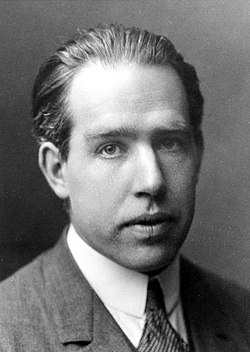Top Qs
Timeline
Obrolan
Perspektif
Niels Bohr
Dari Wikipedia, ensiklopedia bebas
Remove ads
Niels Bohr bernama lengkap Niels Hendrik David Bohr.[1] Bohr 7 Oktober 1885 – 18 November 1962 . Niels Bohr adalah seorang ahli fisika yang pernah meraih hadiah Nobel Fisika pada tahun 1922.
Pada tahun 1913, Bohr menerapkan konsep mekanika kuantum untuk model atom yang telah dikembangkan oleh Ernest Rutherford, yang menggambarkan bahwa atom tersusun dari inti atom (nukleus) yang dikelilingi oleh orbit elektron.
Anak laki-lakinya, Aage Niels Bohr, juga penerima Hadiah Nobel.
Wikimedia Commons memiliki media mengenai Niels Bohr.
Remove ads
Keluarga
Wikiquote memiliki koleksi kutipan yang berkaitan dengan: Niels Bohr.
Niels Bohr dilahirkan dari seorang ayah bernama Christian Bohr,[2] profesor yang ahli di bidang fisiologi, ayahnyalah yang membuat Niels Bohr tertarik dengan dunia fisika.[3] Ibunya bernama Ellen Adler berasal dari keluarga terkemuka dalam bidang pendidikan. Bohr memiliki seorang adik yang bernama Harald.
Pendidikan[3]
Bohr masuk di Gammelholm School pada tahun 1903. Setelah menyelesaikan sekolahnya, Bohr melanjutkan ke jenjang selanjutnya, yaitu ke Universitas Kopenhagen. Di sana Bohr bertemu dengan Professor Christian Christiansen, seorang fisikawan yang nantinya membantu Bohr. Bohr mendapatkan gelar master pada 1909. Dua tahun setelahnya, ia meraih gelar doktor.
Semasa sekolah, Bohr tertantang mengenai pengumuman dari Akademi Sains Kopenhagen yang berisi siapa yang mampu menyelesaikan persoalan ilmiah tertentu akan mendapatkan hadiah. Bohr kemudian meminjam laboratorium sang ayah untuk melakukan ekperimen. Penelitian ini kemudian mendapatkan penghargaan (medali emas).
Remove ads
Bibliografi

- Bohr, Niels (1922). The Theory of Spectra and Atomic Constitution; three essays. Cambridge: Cambridge University Press.
- —— (2008). Nielsen, J. Rud (ed.). Volume 1: Early Work (1905–1911). Niels Bohr Collected Works. Amsterdam: Elsevier. ISBN 978-0-444-53286-2. OCLC 272382249.
- —— (2008). Hoyer, Ulrich (ed.). Volume 2: Work on Atomic Physics (1912–1917). Niels Bohr Collected Works. Amsterdam: Elsevier. ISBN 978-0-444-53286-2. OCLC 272382249.
- —— (2008). Nielsen, J. Rud (ed.). Volume 3: The Correspondence Principle (1918–1923). Niels Bohr Collected Works. Amsterdam: Elsevier. ISBN 978-0-444-53286-2. OCLC 272382249.
- —— (2008). Nielsen, J. Rud (ed.). Volume 4: The Periodic System (1920–1923). Niels Bohr Collected Works. Amsterdam: Elsevier. ISBN 978-0-444-53286-2. OCLC 272382249.
- —— (2008). Stolzenburg, Klaus (ed.). Volume 5: The Emergence of Quantum Mechanics (mainly 1924–1926). Niels Bohr Collected Works. Amsterdam: Elsevier. ISBN 978-0-444-53286-2. OCLC 272382249.
- —— (2008). Kalckar, Jørgen (ed.). Volume 6: Foundations of Quantum Physics I (1926–1932). Niels Bohr Collected Works. Amsterdam: Elsevier. ISBN 978-0-444-53286-2. OCLC 272382249.
- —— (2008). Kalckar, Jørgen (ed.). Volume 7: Foundations of Quantum Physics I (1933–1958). Niels Bohr Collected Works. Amsterdam: Elsevier. ISBN 978-0-444-53286-2. OCLC 272382249.
- —— (2008). Thorsen, Jens (ed.). Volume 8: The Penetration of Charged Particles Through Matter (1912–1954). Niels Bohr Collected Works. Amsterdam: Elsevier. ISBN 978-0-444-53286-2. OCLC 272382249.
- —— (2008). Peierls, Rudolf (ed.). Volume 9: Nuclear Physics (1929–1952). Niels Bohr Collected Works. Amsterdam: Elsevier. ISBN 978-0-444-53286-2. OCLC 272382249.
- —— (2008). Favrholdt, David (ed.). Volume 10: Complementarity Beyond Physics (1928–1962). Niels Bohr Collected Works. Amsterdam: Elsevier. ISBN 978-0-444-53286-2. OCLC 272382249.
- —— (2008). Aaserud, Finn (ed.). Volume 11: The Political Arena (1934–1961). Niels Bohr Collected Works. Amsterdam: Elsevier. ISBN 978-0-444-53286-2. OCLC 272382249.
- —— (2008). Aaserud, Finn (ed.). Volume 12: Popularization and People (1911–1962). Niels Bohr Collected Works. Amsterdam: Elsevier. ISBN 978-0-444-53286-2. OCLC 272382249.
- —— (2008). Aaserud, Finn (ed.). Volume 13: Cumulative Subject Index. Niels Bohr Collected Works. Amsterdam: Elsevier. ISBN 978-0-444-53286-2. OCLC 272382249.
Remove ads
Lihat pula
- Paradoks Einstein–Podolsky–Rosen
Referensi
Pranala luar
Wikiwand - on
Seamless Wikipedia browsing. On steroids.
Remove ads

